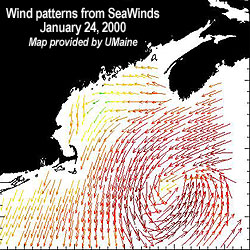January 22, 2005
The storm is real, the word is still fake
 The National Weather Service is warning us that
The National Weather Service is warning us that
A dangerous winter storm will affect the entire area today into Sunday morning. ... Total snow accumulations for the entire event are forecast to average 10 to 15 inches across the area. ... The snow is expected to fall so heavily that near white-out conditions are likely with rates possibly reaching one to two inches per hour.
The weatherfolk tend to overestimate this sort of thing, since inadequate warnings are more culpable than excessive ones. And the TV weatherpeople have even more reason to cry wolf, since big worries lead to big ratings. All the same, I'm sure we're facing our first big snow of the winter. But up and down the Atlantic coast, local articles and local newscasts are using a word that the National Weather Service doesn't: nor'easter.
The Boston Globe doesn't use that word either. As Jan Freeman pointed out in that paper more than a year ago, it's is a phony regionalism:
It's not, after all, a regional pronunciation, as many journalists outside New England now believe. "I grew up on Cape Cod when there still existed a pronounced local accent," wrote George Hand. "The word -- spelled phonetically -- was nawtheastah." Sailors disclaim it, too: They may say sou'wester, but never nor'easter.
Freeman's evaluation accords with my own experience of regional pronunciations growing up in rural eastern Connecticut, as I observed in a post discussing Freeman's article.
Today's storm is (predicted to be) a true northeaster, according to the National Weather Service advisory:
... An area of low pressure was located over the Mississippi River valley early this morning. It is forecast to move to the Ohio Valley later this morning and cross the central Appalachians this afternoon. A secondary low pressure system is then forecast to develop over the Delmarva coastal waters this evening and intensify rapidly.
Why is this a "northeaster"? Last year, I passed along the explanation I was given as a child:
... a northeaster is a winter storm that travels (from southwest to northeast) up the coast, with its center off shore, so that the counter-clockwise circulation of the storm blows in off the ocean full of moisture (from the northeast), dumping the load of moisture as snow and ice when it cools down over the land.
But this is not a nor'easter, as far as I'm concerned in my role as an ordinary human being. That word seems faker to me than the lederhosen at the Biergarten in Walt Disney World. I applaud the Boston Globe's editorial policy against using it. However, as a linguist I have to admit that a nor'easter is what storms like this have become, in the English language at large, whether we like it or not. Quoting Freeman:
The facts ... have not slowed the advance of nor'easter: Even in print, where it's probably less common than in speech, it has practically routed northeaster in the past quarter-century or so. From 1975 to 1980, journalists used the nor'easter spelling only once in five mentions of such storms; in the past year, more than 80 percent of northeasters were spelled nor'easter. It's no more authentic than "nucular" for nuclear or "bicep" for biceps, but it would take a mighty wind, at this point, to blow nor'easter back into oblivion.
In Google News this morning, northeaster has 48 hits to 215 for nor'easter. That's 82% for the fake regionalism.
[Update: Oops -- David Pesetsky shows that I should be more careful. When I said that the National Weather Service didn't use the term nor'easter, I was relying on reading a few notices about this recent storm. But Dave actually searched {noreaster site:noaa.gov}, and found (for example):
URGENT - WINTER WEATHER MESSAGE NATIONAL WEATHER SERVICE TAUNTON MA 950 PM EST FRI JAN 21 2005 .A POWERFUL NOREASTER IS EXPECTED TO BRING HEAVY SNOW AND STRONG WINDS TO MUCH OF SOUTHERN NEW ENGLAND SATURDAY EVENING INTO SUNDAY MORNING...AS IT TRACKS SOUTHEAST OF NANTUCKET. THIS STORM HAS THE POTENTIAL TO PRODUCE BLIZZARD CONDITIONS FROM THE INTERSTATE 95 CORRIDOR TO CAPE COD AND THE ISLANDS.
No apostrophe, but that's a mere orthographic bagatelle. Thanks! ]
Posted by Mark Liberman at January 22, 2005 09:34 AM